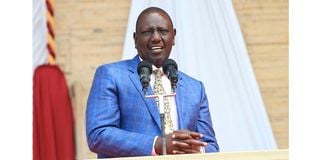Premium
Ruto is right, data from CRB should help reduce cost of borrowing

President William Ruto. The president is correct to insist that lenders must use the score, and not just a negative listing because the score contains a more holistic picture.
What you need to know:
- Best practice requires lenders to use risk-based pricing. At the point of lending, the lender should estimate the probability that you will default on that loan.
- Moreover, she must estimate loss given default. With these two pieces of information, she can accurately predict the expected loss of that loan.
- The president is correct to insist that lenders must use the score, and not just a negative listing because the score contains a more holistic picture.
Speaking after meeting Safaricom and her partner banks mid-week, President William Ruto insisted that credit scoring must be used appropriately and not deny credit. He is absolutely right. Here is why.
Best practice requires lenders to use risk-based pricing. At the point of lending, the lender should estimate the probability that you will default on that loan.
Moreover, she must estimate loss given default. With these two pieces of information, she can accurately predict the expected loss of that loan.
That expected loss should be reflected in the pricing of the loan. Let us briefly examine the how.
At the point of lending, payment or default is a future event. How can the lender make an accurate prediction?
One of the best sources of that prediction is your prior history. If you have been paying, chances are you will pay.
But credit history is not the only possibility. For instance, when building a credit scoring tool for small businesses in Egypt some years ago, we found that the presence and number of phone lines had predictive value.
Where can we obtain your credit history? By sharing your credit behaviour from as many lenders and sources as possible.
For instance, we consume water on credit and pay at the end of the month. Same with rent. Same with electricity. Same with post-paid phones.
Many regular, daily, transactions generate credit useful data. Credit reference bureaus (CRBs) are the entities that aggregate that data. They are licensed and regulated by the Central Bank.
The current notion that CRBs just produce a blacklist is partly the result of how they started, lenders’ inability to use credit scores appropriately and the regulator’s reluctance to allow utilities and trade data into the credit information sharing mechanism.
At the beginning in 2010, banks were nervous that credit information sharing could give away competitive information. They therefore started by sharing negative data.
It took another five years for the banks to share both positive and negative data – that is both when you pay and when you don’t. It is from this full picture that CRBs generate your score.
The president is correct to insist that lenders must use the score, and not just a negative listing because the score contains a more holistic picture.
Still, there is plenty of opportunity to have better, more predictive scores – by allowing CRBs to incorporate consumer credit data from phone and water companies, Kenya Power and others.
The credit score is indicative of the probability of default. Combined with loss given default, it enables the lender to calculate expected loss, thereby pricing the risk.
CRBs have been working with banks and other lenders to get everyone on the same page. A session last week had 88 participants from 21 banks. But clearly, there is plenty of scope to do better.
@NdirituMuriithi is an economist





